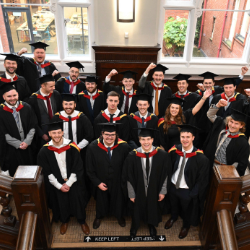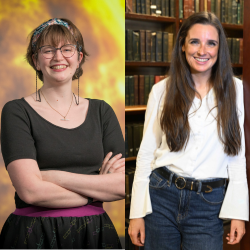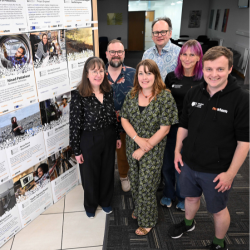-
Study
-
Quick Links
- Open Days & Events
- Real-World Learning
- Unlock Your Potential
- Tuition Fees, Funding & Scholarships
- Real World Learning
-
Undergraduate
- Application Guides
- UCAS Exhibitions
- Extended Degrees
- School & College Outreach
- Information for Parents
-
Postgraduate
- Application Guide
- Postgraduate Research Degrees
- Flexible Learning
- Change Direction
- Register your Interest
-
Student Life
- Students' Union
- The Hub - Student Blog
- Accommodation
- Northumbria Sport
- Support for Students
-
Learning Experience
- Real-World Learning
- Research-enriched learning
- Graduate Futures
- The Business Clinic
- Study Abroad
-
-
International
International
Northumbria’s global footprint touches every continent across the world, through our global partnerships across 17 institutions in 10 countries, to our 277,000 strong alumni community and 150 recruitment partners – we prepare our students for the challenges of tomorrow. Discover more about how to join Northumbria’s global family or our partnerships.
View our Global Footprint-
Quick Links
- Course Search
- Undergraduate Study
- Postgraduate Study
- Information for Parents
- London Campus
- Northumbria Pathway
- Cost of Living
- Sign up for Information
-
International Students
- Information for International Students
- Northumbria and your Country
- International Events
- Application Guide
- Entry Requirements and Education Country Agents
- Global Offices and Regional Teams
- English Requirements
- English Language Centre
- International student support
- Cost of Living
-
International Fees and Funding
- International Undergraduate Fees
- International Undergraduate Funding
- International Masters Fees
- International Masters Funding
- International Postgraduate Research Fees
- International Postgraduate Research Funding
- Useful Financial Information
-
International Partners
- Agent and Representatives Network
- Global Partnerships
- Global Community
-
International Mobility
- Study Abroad
- Information for Incoming Exchange Students
-
-
Business
Business
The world is changing faster than ever before. The future is there to be won by organisations who find ways to turn today's possibilities into tomorrows competitive edge. In a connected world, collaboration can be the key to success.
More on our Business Services-
Business Quick Links
- Contact Us
- Business Events
- Research and Consultancy
- Education and Training
- Workforce Development Courses
- Join our mailing list
-
Education and Training
- Higher and Degree Apprenticeships
- Continuing Professional Development
- Apprenticeship Fees & Funding
- Apprenticeship FAQs
- How to Develop an Apprentice
- Apprenticeship Vacancies
- Enquire Now
-
Research and Consultancy
- Space
- Energy
- AI Futures
- CHASE: Centre for Health and Social Equity
- NESST
-
-
Research
Research
Northumbria is a research-rich, business-focused, professional university with a global reputation for academic quality. We conduct ground-breaking research that is responsive to the science & technology, health & well being, economic and social and arts & cultural needs for the communities
Discover more about our Research-
Quick Links
- Research Peaks of Excellence
- Academic Departments
- Research Staff
- Postgraduate Research Studentships
- Research Events
-
Research at Northumbria
- Interdisciplinary Research Themes
- Research Impact
- REF
- Partners and Collaborators
-
Support for Researchers
- Research and Innovation Services Staff
- Researcher Development and Training
- Ethics, Integrity, and Trusted Research
- University Library
- Vice Chancellors Fellows
-
Research Degrees
- Postgraduate Research Overview
- Doctoral Training Partnerships and Centres
- Academic Departments
-
Research Culture
- Research Culture
- Research Culture Action Plan
- Concordats and Commitments
-
-
About Us
-
About Northumbria
- Our Strategy
- Our Staff
- Our Schools
- Place and Partnerships
- Leadership & Governance
- University Services
- Northumbria History
- Contact us
- Online Shop
-
-
Alumni
Alumni
Northumbria University is renowned for the calibre of its business-ready graduates. Our alumni network has over 253,000 graduates based in 178 countries worldwide in a range of sectors, our alumni are making a real impact on the world.
Our Alumni - Work For Us
A two-day event on the dynamics of time-delay systems
22-23 March 2023
A multidisciplinary two-day workshop on the study of delays in nonlinear dynamics. Delays, which can either be constant, time-, state- or noise-dependent, generically induces an infinite-dimensional nature for the dynamical system. Recent theoretical and numerical advances enable the detection and description of bifurcations and chaotic transitions, in particular in the presence of environmental noise. These breakthroughs have far-reaching consequences in various scientific fields where
delays are ubiquitous, such as climate modelling, epidemiology, endocrinology, nonlinear optics, control theory and engineering.The workshop will feature 12 speakers from the very active community of researchers contributing to the study of delayed phenomena, thriving in three main scientific areas of study:
- Development of theoretical knowledge to characterise global and local dynamics in delayed systems
- Development of numerical tools for the detection and continuation of bifurcations in multidimensional parameter spaces
- Modelling physical or biological systems taking into account inherent delays and making use of theoretical and numerical tools to describe bifurcations or critical phenomena.
This meeting is made possible thanks to the support of the London Mathematical Society and the Department of Mathematics, Physics and Electrical Engineering at Northumbria University. The workshop will be held in person. Talks will be livestreamed. Let us know if you would like to participate remotely, and we will send you the information on how to access the livestream.
Speakers
- Dr Tyler Cassidy (Leeds)
- Dr Marianna Cerasuolo (Portsmouth)
- Prof Rod Halburd (UCL)
- Dr Natalia Janson (Loughborough)
- Dr Andrew Keane (Cork)
- Dr Andrew Krause (Durham)
- Dr Yuliya Kyrychko (Sussex)
- Dr Sarah Loos (Cambridge)
- Prof Xuerong Mao (Strathclyde)
- Dr Francesca Scarabel (Leeds)
- Dr Kyle Wedgwood (Exeter)
- Dr Serhiy Yanchuk (Potsdam)
Schedule
- 1.00-1.15pm
- Welcome
- 1.15-1.50pm
- Marianna Cerasuolo (Portsmouth)
- 1.50-2.25pm
- Kyle Wedgwood (Exeter)
- 2.25-3pm
- Yuliya Kyrychko (Sussex)
- 3-3.45pm
- Coffee break and poster (in ELA 003)
- 3.45-4.20pm
- Serhiy Yanchuk (Potsdam)
- 4.20-4.55pm
- Francesca Scarabel (Leeds)
- 4.55-5.30pm
- Andrew Keane (Cork)
- 9.05-9.40am
- Sarah Loos (Cambridge)
- 9.40-10.15am
- Xuerong Mao (Strathclyde)
- 10.15-11am
- Coffee break and discussions
- 11.00-11.35am
- Natalia Janson (Loughborough)
- 11.35-12.10pm
- Rod Halburd (UCL)
- 1.00-1.35pm
- Andrew Krause (Durham)
- 1.35-2.10pm
- Tyler Cassidy (Leeds)
23 March
Abstracts
- Marianna Cerasuolo (Portsmouth)
- Numerics and approximations for gamma distributed delay differential equations
Prostate cancer is the fifth most common cause of death from cancer, and the second most common diagnosed cancer in men. In the last few years many mathematical models have been proposed to describe the dynamics of prostate cancer under treatment. So far one of the major challenges has been the development of mathematical models that could represent experiments in vivo conditions (experiments on individuals) and therefore be suitable for clinical applications, while being mathematically tractable.
In this talk, taking a step in this direction, I am going to propose a nonlinear distributed-delay dynamical system that explores neuroendocrine transdifferentiation in human prostate cancer in vivo. Sufficient conditions for the existence and the stability of a tumour-present equilibrium will be given, and the occurrence of a Hopf bifurcation will be proven for a uniform delay distribution. Numerical simulations will be showed to explore differences in behaviour for uniform and exponential delay distributions. The study of the dynamical system will show how the choice of the delay distribution is key in defining the dynamics of the system and in determining the conditions for the onset of oscillations following a switch in the stability of the tumour-present equilibrium. - Tyler Cassidy (Leeds)
- Numerics and approximations for gamma distributed delay differential equations
Gamma distributed delay differential equations (DDEs) arise naturally in many modelling applications. However, appropriate numerical methods for generic gamma distributed DDEs have not previously been implemented. Modellers have therefore resorted to approximating the gamma distribution with an Erlang distribution and using the linear chain technique to derive an equivalent system of ordinary differential equations (ODEs). Unfortunately, this Erlang approximation imposes an artificial relationship between the mean and variance of the delayed process. Accordingly, we develop a numerical method to numerically integrate the gamma distributed DDE without relying on the Erlang approximation. Alternatively, we derive an ODE approximation of the gamma distributed DDE that is a more accurate than the common Erlang approximation. Using our numerical method to provide reference solutions, we show that the Erlang approximation may produce qualitatively different solutions that the underlying gamma distributed DDE while our proposed approximation does not.
Contact the organisers:
Stefan RuschelBenoit Huard
Get an insight into life at Northumbria with videos and 360 panoramas of the Department of Mathematics, Physics and Electrical Engineering
Latest News and Features

First cohort of Civil Engineering Degree Apprentices graduate from Northumbria
The inaugural cohort of Civil Engineering degree apprentices have graduated from Northumbria…

Space sector growth in the UK under spotlight at major industry event
The role the space sector is playing in driving economic growth in the UK was highlighted this…

Northumbria University STEM outreach project wins Institute of Physics award
Researchers from an outreach group at Northumbria University are celebrating after winning…

Northumbria researchers announced as winners of Future Leaders Fellowships
Two talented researchers from Northumbria University have been awarded a share of £120 million…

Northumbria expands results day support for students
Northumbria University is expanding and enhancing the support it provides to students receiving…

OLED materials have potential new uses in detecting pesticides for the farming industry
Researchers are set to shine a different kind of light on the farming industry after receiving…

Northumbria STEM outreach project marks major milestone
An outreach group from Northumbria University is celebrating a decade of STEM engagement in…

CubeSat mission a step closer to blast off as industry invited to join final push into orbit
A consortium of academic and industry partners has come a step closer to launching the UK’s…



